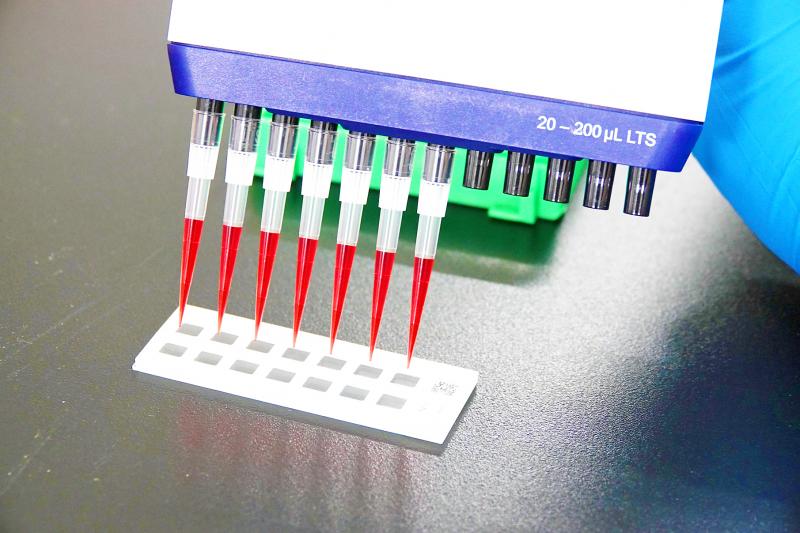Researchers at National Cheng Kung University in Tainan have developed a chip that can evaluate antibody response against multiple SARS-CoV-2 variants with only one drop of blood.
The multiplexed CoVariant protein microarray was developed by a team led by Syu Guan-da (許觀達), an assistant professor at the department of biotechnology and bioindustry sciences, the university said in a statement on Tuesday.
The team also developed a multiplexed spike variant protein microarray to profile the humoral immunity of COVID-19 cases experiencing varying severity of illness, which can help separate people with severe symptoms and provide preventive drugs, the university said.

Photo courtesy of National Cheng Kung University
The two studies have been published in the international journals Biosensors and Bioelectronics and Analytical Chemistry.
COVID-19 vaccines were designed using a wild-type strain, which is why their efficacy against SARS-CoV-2 variants is not clear, Syu said.
The different reactions people experience after receiving a COVID-19 vaccine suggest a need for a way to measure immune responses against multiple variants, he added.
The fingertip-sized microarray developed by the team can measure antibody responses and neutralizing activities against multiple SARS-CoV-2 variants, the results of which can be produced in less than two hours, he said.
The surrogate method used in the study is simpler and safer than the complex and potentially dangerous traditional method that can only be conducted by professionals, as it involves virus-infected cells, he added.
The microarray technology, which can be used to analyze multiple variants, only requires samples in small quantities, and is time-saving and economical.
The contributions of National Cheng Kung University Hospital vice-director Ko Wen-chien (柯文謙) and department of pediatrics physician He Tsung-hsien (何宗憲) were also key to the success of the research.
The ability to use a small amount of blood to conduct multiple tests “sounded like a dream come true,” Syu said.
The microarray technology has been patented in Taiwan, and its US patent application is under review, Syu said, adding that cooperation with manufacturers on technology transfer is being discussed.
The team is also developing a portable scanner, which would be convenient for small clinics, telemedicine and home care, he said.

A preclearance service to facilitate entry for people traveling to select airports in Japan would be available from Thursday next week to Feb. 25 at Taiwan Taoyuan International Airport, Taoyuan International Airport Corp (TIAC) said on Tuesday. The service was first made available to Taiwanese travelers throughout the winter vacation of 2024 and during the Lunar New Year holiday. In addition to flights to the Japanese cities of Hakodate, Asahikawa, Akita, Sendai, Niigata, Okayama, Takamatsu, Kumamoto and Kagoshima, the service would be available to travelers to Kobe and Oita. The service can be accessed by passengers of 15 flight routes operated by

Chinese spouse and influencer Guan Guan’s (關關) residency permit has been revoked for repeatedly posting pro-China videos that threaten national security, the National Immigration Agency confirmed today. Guan Guan has said many controversial statements in her videos posted to Douyin (抖音), including “the red flag will soon be painted all over Taiwan” and “Taiwan is an inseparable part of China,” and expressing hope for expedited reunification. The agency last year received multiple reports alleging that Guan Guan had advocated for armed reunification. After verifying the reports, the agency last month issued a notice requiring her to appear and explain her actions. Guan

GIVE AND TAKE: Blood demand continues to rise each year, while fewer young donors are available due to the nation’s falling birthrate, a doctor said Blood donors can redeem points earned from donations to obtain limited edition Formosan black bear travel mugs, the Kaohsiung Blood Center said yesterday, as it announced a goal of stocking 20,000 units of blood prior to the Lunar New Year. The last month of the lunar year is National Blood Donation Month, when local centers seek to stockpile blood for use during the Lunar New Year holiday. The blood demand in southern Taiwan — including Tainan and Kaohsiung, as well as Chiayi, Pingtung, Penghu and Taitung counties — is about 2,000 units per day, the center said. The donation campaign aims to boost

The Central Weather Administration (CWA) said a magnitude 4.9 earthquake that struck off the coast of eastern Taiwan yesterday was an independent event and part of a stress-adjustment process. The earthquake occurred at 4:47pm, with its epicenter at sea about 45.4km south of Yilan County Hall at a depth of 5.9km, the CWA said. The quake's intensity, which gauges the actual effects of a temblor, was highest in several townships in Yilan and neighboring Hualien County, where it measured 4 on Taiwan's seven-tier intensity scale, the CWA said. Lin Po-yu (林柏佑), a division chief at the CWA's Seismological Center, told a news conference